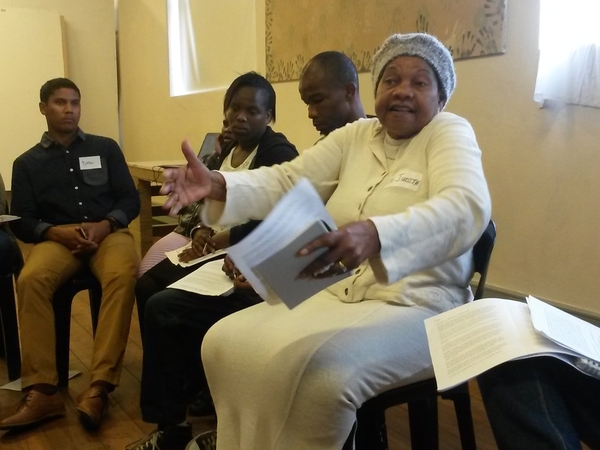Use the law, not violence, say activists at land conference

People facing eviction needed knowledge of the laws and their rights, a member of the South Road community told the urban land justice colloquium on 13 October.
The 2nd Annual Urban Land Justice Colloquium hosted by Ndifuna Ukwazi and the Socio-Economic Rights Institute (SERI) kicked off with a mood of jubilation as the tenants of South Road, Wynberg, celebrated their victory in the Western Cape High Court on Monday. The court halted the eviction of 26 families whose homes are in the way of the proposed MyCiti bus route in Wynberg.
The ruling stipulates that the City of Cape Town must involve the tenants in meaningful public participation and must consider the alternatives that have been presented.
Clive Muller and Hazel Abrahams of the South Road Families Association (SRFA) spoke about the association’s peaceful and persistent battle since September last year when residents received eviction orders.
“We were just blatantly told not to question the City,” said Muller.
He said that when the families tried to find out what was happening they were told that the City owned the land and that the residents had no recourse.
Abrahams, who has lived in South Road for 13 years, said the City had yet to prove that the community participation process would be meaningful.
Asked what advice he would give other communities facing similar struggles, Muller said: “Do not get violent. Fight honourably. We did not resort to burning tyres and we did not damage property. We lit candles and we prayed.”
He said that residents facing eviction needed to gain knowledge of the laws and their rights.
“Do not let people dictate to you about things that have a profound impact on your life,” he said.
Carol White and Fuad Isaacs, tenants in the De Waal Drive flats, have also resisted eviction, this time by the provincial authorities. They were threatened with increased “market related” rentals and told that if they could not afford these new rentals they could move to Pelican Park on the Cape Flats.
The province has since backed down on the threats but the future of residents is still uncertain.
Isaacs, who has lived in the flats for 12 years, said he would not move.
“I told the Department [of Human Settlements] that they are going to have to drag me out,” he said.
White, who has been a tenant in the flats for 18 years, said residents were still unsettled. “Every time we ask questions we get no answers. The last time I spoke to Human Settlements I was told our leases are still being drawn up.”
She said that the next step was to fight for home ownership.
“People have been there so long, people have paid over and over for their flats,” she said.
Meanwhile, at a discussion on land occupation at the event, 66-year-old Marikana resident, Judith Sikade, said living in the Philippi East informal settlement was like living in a desert.
“We don’t have access to water, toilets or our own electricity there. We have to pay people in Lower Crossroads to use their toilets and to get water from their taps. Some of the people are chronic and elderly. This is how we have to live,” she said.
The Philippi East settlement, named after the massacre in Marikana, was started by Lower Crossroad backyarders.
They occupied the privately-owned land between 2013 and 2015. After a number of violent clashes with police and the Anti-Land Invasion Unit (ALIU), thousands of new residents have managed to build their shacks.
On Tuesday, Sikade recalled being in the front line of a “human shield,” formed by residents, in a bid to stop law enforcement and the ALIU demolishing their shacks in 2014.
“There was no warning, but we chose to resist the eviction peacefully. I told people to stand in front of their houses or to go inside so they couldn’t break them down. It was so chaotic after that … People are still traumatised today about what happened,” she said.
Sikade said she was amazed when a group of people from neighbouring townships “celebrated and rejoiced” over their eviction while another group “just stood there and watched.”
“We know what our rights are now. We will take this matter to the highest court,” she said.
Asked about the community’s attempts to engage with the City of Cape Town, Sikade said, “We have been labelled as troublemakers. Every time we march to the civic centre to hand over a memorandum, it gets thrown away. We’ve lost faith in going through those processes.”
Housing activist Boitumelo Ramahlele, who assisted Marikana residents, said it was important for communities to collect and document their own evidence during eviction processes.
“We took photos and videos during and after the evictions. We interviewed people who lived there and we kept records of our meetings. We got the media involved, organisations and lawyers, anyone we thought could help,” he said.
Ramahlele said residents also attended workshops where they learned more about the Prevention of Illegal Eviction and Unlawful Occupation of Land Act.
The Social Justice Coalition’s Axolile Notywala added that in the SJC’s engagements with the City since 2009, it was clear there was no plan for informal settlements.
“Only 10% of the 204 informal settlements in Cape Town are included in the City’s reblocking and servicing plans. Of those, some have been on that plan for four years and nothing has changed,” he said.

This article is licensed under a Creative Commons Attribution-NoDerivatives 4.0 International License.


